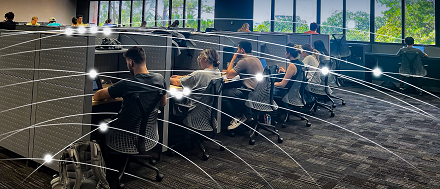This month, UF Information Technology (UFIT) is launching a proactive educational and communication initiative aimed at enhancing student awareness and utilization of eduroam.
This initiative was conceived in response to student feedback regarding the quality and accessibility of Wi-Fi in the university’s public areas, particularly in the UF libraries. After thorough testing conducted by UFIT staff, it was determined that the Wi-Fi infrastructure in the libraries is operating as intended. Further analysis indicated that students can significantly enhance their Wi-Fi experience by making two simple adjustments: enrolling their devices in the eduroam service and deactivating their smartphone’s hot spot. Thus the three messaging “drumbeats” are the focus of the campaign:
- You’re a Gator—not a [UF] Guest! Enroll in eduroam.
- Get on eduroam for up to 10X’s faster internet!
- DYK? Your phone’s Wi-Fi hotspot interferes with the Wi-Fi campus signal.
Another benefit students will see upon enrolling in eduroam is they won’t have to re-register every 24 hours to use the UF Guest Wi-Fi. Device registration eliminates the need to do that, while also providing the most secure connection available.
Outreach support for the You’re a Gator–not a [UF] Guest! campaign includes monitor images, multiple videos, a social media campaign, signage in strategic, student gathering locations, and tabling events. Campaign materials (e.g., monitor images, videos, and stickers) will be made available to UF’s colleges and divisions, to help spread the word. Anyone with questions about the campaign is welcome to contact UFIT Communications.





